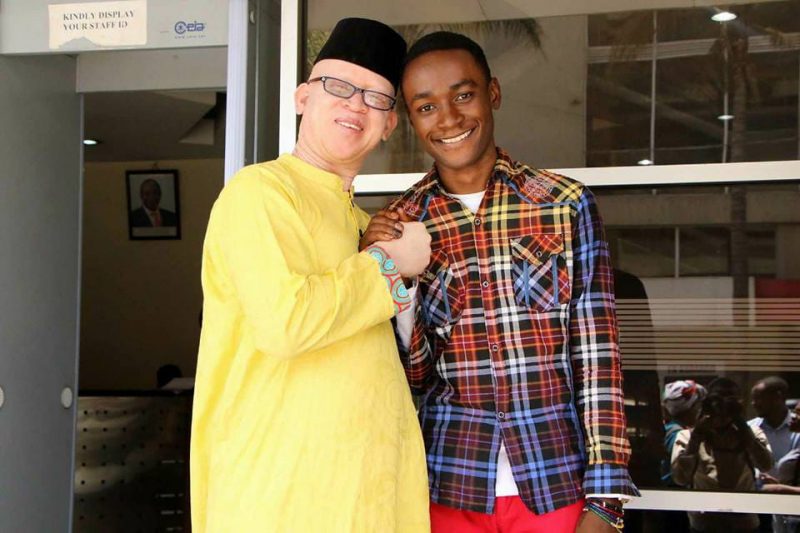Imagine looking healthy on the outside, but battling a life-threatening rare disease on the inside. It is an insidious war that leaves me often drained both physically and emotionally. Living with sickle-cell disease is like waking up to battle every day, and often, been constantly reminded of the odds.
This is my story living with Sickle cell. I am sharing it with you with the hope that I can make more and more people understand what it means to live with the disease.
Sickle cell disease is an autosomal recessive genetic blood disorder whereby an abnormal type of haemoglobin distorts the shape of the Red blood cells making them hard and uncomfortable to manoeuvre through the blood vessels. The excruciating pain episodes are known as a crisis.
My name is Mudukiza Joe, I have sickle-cell disease. I was diagnosed with sickle-cell at six months of age. I am now 23. When statistics are bandied around about life expectancy for people like me, it truly feels like having to face your mortality every single day.
But that is beside the point. For me, what is crucial now more than ever is information.
I want to tell you just how urgently people with sickle-cell need Awareness, Education and Free medication from the Government and its stakeholders.
I have been hospitalized so many times that my medical record is now more than my life biography. I have almost 900 scattered pages in my medical record from my personal doctor alone.
Life expectancy is 40 to 45.
I live with pain every day. The problem with the kind of pain I live with is that it is an insidious battle ravaging your body on the inside and rarely visible on the outside. The pain comes in two forms:
Chronic pain – this comes from the damage that sickle-cell disease does to the body over many years. My right knee, my left clavicle, my lower back are all damaged because of the disease. I get chronic headaches. All these are the result of a lifetime of crisis.
Acute pain – this is the real crisis that can’t be controlled, where the pain is so intense and the risk of damage to my organs so great that it requires hospitalization. That hospitalization can result in yet more pain, not physical but emotional and psychological pain.
But those are just the simple facts. So, let me give you the details of what it’s really like to live with sickle-cell disease.
It means being in a constant state of limbo because you have no idea when the next crisis is going to take over and you have to stop your life. You have absolutely no idea how bad the pain will be or how long it will last.
It means having to put your life on hold so often that it’s hard to have a job, hard to have a career or lead a normal life. Hard to do the things everyone else takes for granted. For example, in my 20’s, while all my friends from home and college are building careers and getting married and having families, I am in a cancer ward trying to stay alive, because that’s where they put you when you have sickle-cell disease. The cancer ward! I am not saying this to draw pity or any of those mishy mashy wooies, they do me no good now. I am saying this so that you are aware that people in my situation need help. A lot of it.
Seven years ago I had an acute pain crisis in my arms. I also had chest pain which happens to almost every sickle-cell patient, I was gasping for breath.
I was admitted to the hospital. I was afraid because I thought I was dying. Doctors moved me to a room where they started inserting tubes in my body, a breathing mask over my face and pushed air into my lungs, I later collapsed and went into a coma. As a child I was able to run, jump and play, my parents continued encouraging me to be active.
Painful episodes occur specifically in my arms, my legs and usually in my joints and since I became an adult I started experiencing pain more often all over my body. My pain is usually cyclic, and it comes on so fast, It feels like someone is ripping off my skin and pouring broken glass into my veins and expecting me to keep living normally.

‘I am Not A Drug Addict’
People talk about new treatments that are more effective at keeping the disease under control. But let me tell you! A Kenyan boy of my age walking into a hospital Emergency Room saying I have a sickle-cell crisis and need pain medications, and then naming the ones I need, too often I don’t get treated as a patient, I get treated like a drug addict, a drug seeker.
Even when the doctors do agree to give me the medications I need, they often act in a way that clearly shows they don’t believe me. They ask, “How do we know this is a crisis, why is it taking you so long for the medication to take effect?” These are people who spent a few days in medical school reading from a textbook about sickle-cell disease. I have spent a lifetime living with it and apparently, that’s still not enough for them to trust that I do know what I am talking about. These conversations are difficult.
That’s when I usually say, “Goodbye and don’t forget to send in your replacement doctor because I can’t work with you.”
I have had doctors take away my medication because they wanted to see how I would react without it.
If I dare to question what a doctor or nurse does, they often tell me they have to go and take care of other patients who are really sick, not like me.
Even when I talk in my “nice modern” voice they still treat me and call me “an angry mentally unhealthy boy”. I’m a 23-year-old man but I get treated like a child.
It’s hard to be in hospital surrounded by doctors and nurses and yet feel abandoned by the medical staff around you. This is what I have been reduced to. It feels forlorn. It betrays everything I thought I knew about grown-up life.
This year alone, more than 25 people have died from sickle-cell in Kenya. It’s not because we don’t have treatments that can help. It’s due to negligence, not getting the right care at the right time. In seeking support, we have a group of people living with the disease and sharing their journey. It helps. Until somebody is no more. It gets difficult.
The government needs to invest more and more in research and putting up proper infrastructure to deal with diseases such as sickle-cell. It will ease our burden.
Dare I say that we need more and more people to know what sickle-cell is. And no, it has nothing to do with curses and bad omens. These notions frustrate any effort to get proper care when it is urgently needed.
Just Call Me Joe
Because I know what it means to live in constant pain, I try my best to create awareness.
This year I have been lucky that Kapsabet Boys drama club is helping advocate about the same condition, being here is like I am at home with my little brothers who understand that I might go into a crisis any time yet they don’t treat me differently, it’s like my second home and I am accepted fully.
At Kapsabet, I met a team of spirited young men who understand what I go through and we are using drama to dimistify sickle cell in the society as I follow-up on the Parliamentary petition that is now with the Parliamentary Health Committee. Hopefully, all will go well.
Now that you know who Joe Mudukiza is, will you do me a favour?
I would like people to know me as Joe first. I am not ‘sickle-cell’. It just resides in me. Please call me Joe? Not that boy with sickle cell or sick boy or all those names you brand me.
Also, talk more about sickle-cell. Let people know what it is. To the medical fraternity, treat us with care. To the government, make modern treatment for sickle-cell accessible and affordable to us.
It can be done!












